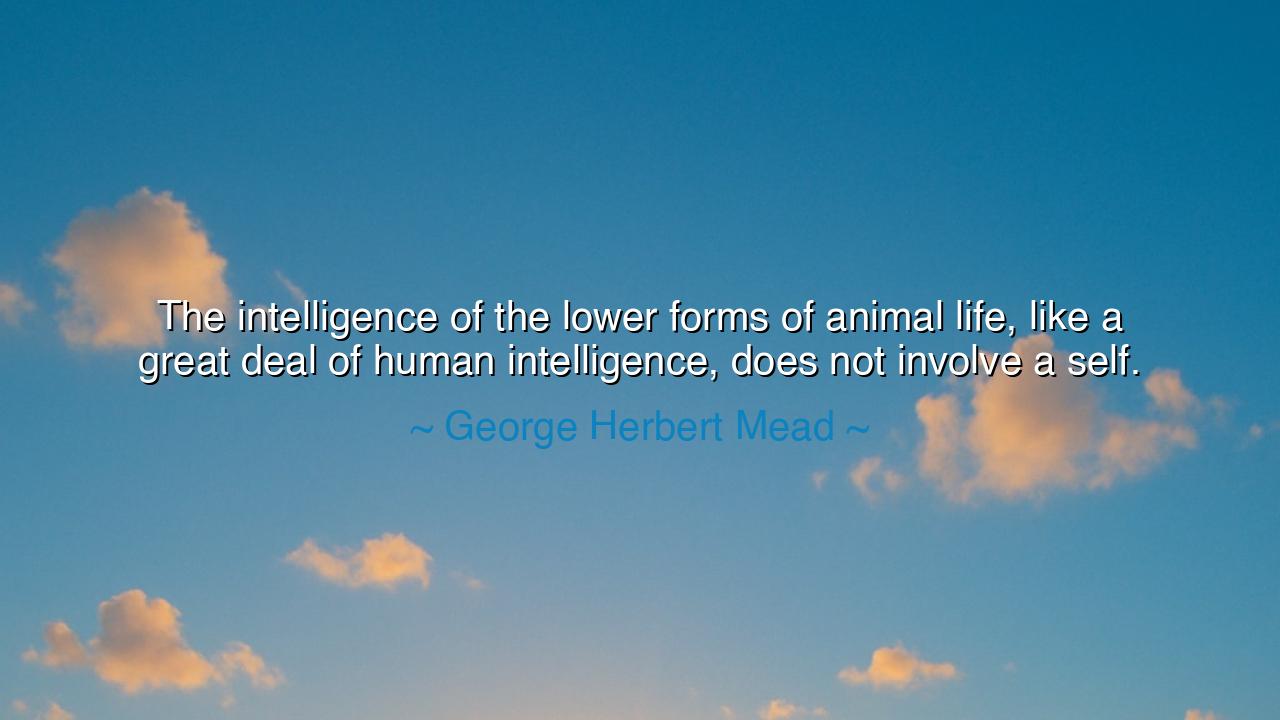
The intelligence of the lower forms of animal life, like a great
The intelligence of the lower forms of animal life, like a great deal of human intelligence, does not involve a self.






The words of George Herbert Mead, philosopher of mind and master of understanding human consciousness, are as sharp as they are profound: “The intelligence of the lower forms of animal life, like a great deal of human intelligence, does not involve a self.” In this sentence, Mead opens a window into the very nature of what it means to be aware — not merely to think, but to know that we think. His insight pierces the veil between instinct and identity, reminding us that intelligence alone does not make us human; it is self-awareness, the reflective consciousness of “I,” that elevates us beyond the mechanical and the instinctive. Here, he warns that much of what we call human thought remains, even now, closer to the animal — reactive, unexamined, and driven not by choice but by habit and impulse.
To grasp the origin of this thought, we must understand Mead’s philosophy. Living in the early twentieth century, he sought to unravel the mystery of the self — that strange and delicate creation born not in isolation, but through communication and society. In his view, the self arises when the individual sees himself through the eyes of others — when he becomes both actor and observer of his own being. Before that awakening, even the cleverest creature acts only from impulse or learned pattern, not from reflection. Thus, the lower forms of animal life, though intelligent in survival, do not yet possess a self. But what is haunting in Mead’s statement is his comparison — for he adds, “like a great deal of human intelligence.” Here he strikes at our pride, suggesting that much of what passes for thought in mankind is still unconscious — guided by fear, desire, and imitation rather than true understanding.
The ancients, too, wrestled with this question — what separates man from beast? The philosopher Plato, in his Republic, spoke of the tripartite soul: reason, spirit, and appetite. When reason rules, man is whole; when appetite or instinct rules, he falls to the level of the animal. Mead’s words are an echo of this ancient truth. He calls upon us to awaken, to rise from the dream of mere intelligence into the light of self-awareness. For intelligence without the self is cunning without conscience, motion without meaning, thought without soul. It can build machines and conquer empires — but it cannot know why. It can solve problems — but not know itself.
History, too, bears witness to this peril. Consider the story of the Industrial Revolution, when humanity’s mechanical intelligence reached new heights. The world transformed — engines roared, cities rose, and science flourished — yet man himself became, in many places, more machine than master. Children toiled in factories; nature was ravaged for profit. Intelligence triumphed, but the self — the compassionate, reflective consciousness that gives meaning to intelligence — was forgotten. In this way, mankind resembled the lower creatures that act efficiently but without reflection. We had become clever animals, building cages of our own design.
And yet, even in that darkness, there were those who remembered. Think of Socrates, who wandered the streets of Athens asking, “Know thyself.” He sought not to measure the stars or conquer lands, but to awaken the self — to make man conscious of his own mind. When he said that “the unexamined life is not worth living,” he echoed the same truth that Mead would later express: that intelligence without awareness is empty, and action without reflection is blind. To possess a self is to possess the power of choice — to rise above the storm of instinct and see one’s life not merely as a chain of reactions, but as a story one can shape.
Mead’s insight therefore carries both warning and promise. He reminds us that intelligence alone — cleverness, memory, strategy — is not enough to make us wise or even truly human. A machine can calculate; an animal can learn; but only a self-aware being can reflect upon his own nature, change his course, and seek higher purpose. Without the self, even the brightest intellect is enslaved to its impulses, serving ends it does not understand. But with self-awareness, intelligence becomes a servant of wisdom, a tool for growth and compassion.
Thus, the lesson of George Herbert Mead’s words is timeless: awaken the self within your intelligence. Do not be content merely to think — learn to witness your thinking. Question your motives, your actions, and your desires. Let your mind not merely react, but reflect. In this way, you will transform your intelligence into understanding, and your understanding into wisdom. The true measure of a human being is not how much he knows, but how deeply he knows himself.
So, dear listener, remember: the beasts of the field act with instinct; the machines of men act with calculation; but only the awakened soul acts with self-knowledge. Cultivate the mind, yes — but cultivate the mirror of the mind more. For in that mirror lies the spark of the divine — the power to see, to choose, and to become. And in that awakening, the intelligence that once bound you will become the light that guides you, lifting you from the shadows of instinct into the radiant freedom of true consciousness.






AAdministratorAdministrator
Welcome, honored guests. Please leave a comment, we will respond soon